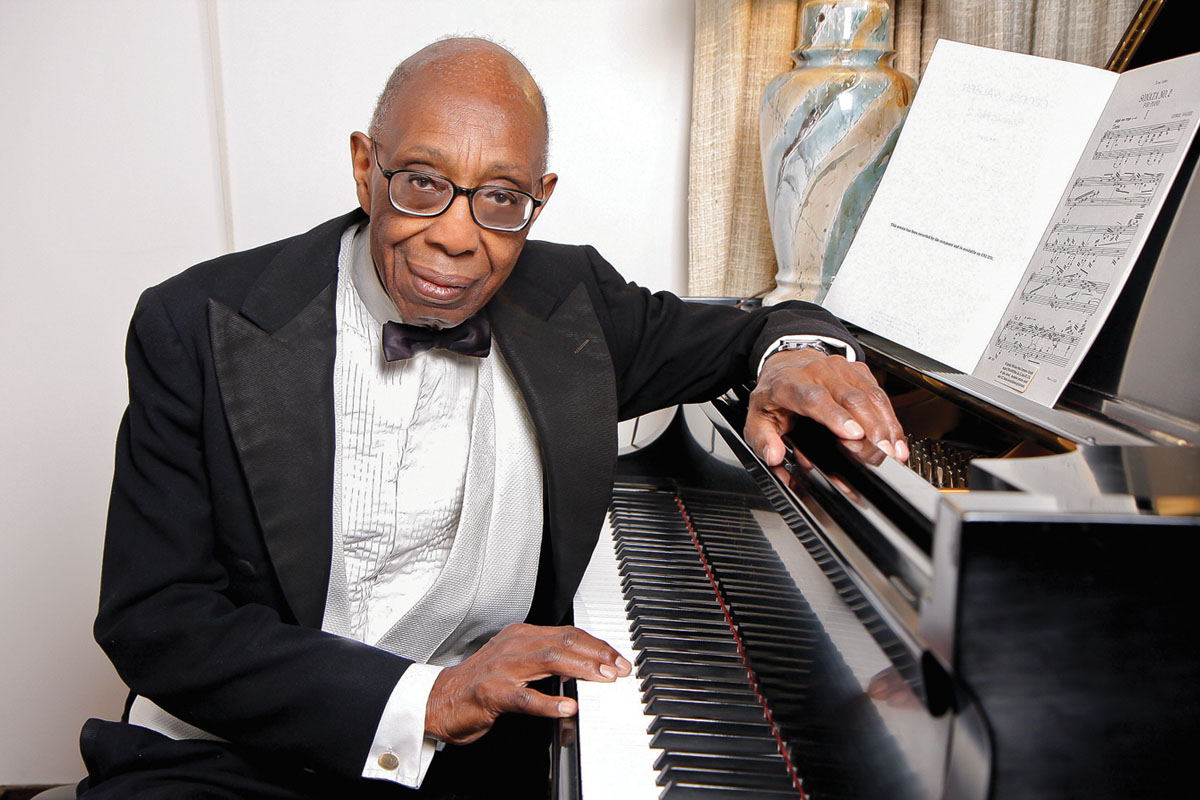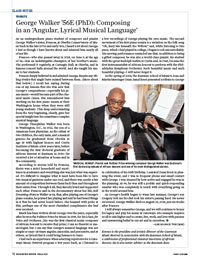Class Notes
 ‘MUSICAL GENIUS’: Pianist and Pulitzer Prize–winning composer George Walker was Eastman’s first doctoral graduate of African descent and one of its most distinguished alumni. (Photo: Frank Schramm)
‘MUSICAL GENIUS’: Pianist and Pulitzer Prize–winning composer George Walker was Eastman’s first doctoral graduate of African descent and one of its most distinguished alumni. (Photo: Frank Schramm)As an undergraduate piano student of composer and pianist George Walker’s sister, Frances, at Oberlin Conservatory of Music back in the late 1970s and early ’80s, I heard a lot about George. I feel as though I have known about and admired him nearly all of my life.
Frances—who also passed away in 2018, on June 9, at the age of 94—was an indefatigable champion of her brother’s music. She performed it regularly, at Carnegie Hall, at Oberlin, and in famous concert halls around the world. And she taught his music to her students.
Frances deeply believed in and admired George, despite any sibling rivalry that might have existed between them. (More about that below.) I recall her saying during one of my lessons that she was sure that George’s compositions—especially his piano music—would become part of the classical music canon. She remembered him working on his first piano sonata at their Washington home when they were still young students. This deep understanding from the very beginning, clearly, gave her special insight into his sometimes-complex musical language.
George Theophilus Walker was born in Washington, D.C., in 1922, the son of a Jamaican-born physician. As the oldest of two children, the only male, and a musical genius—he graduated from Oberlin at age 18 with highest honors and Curtis Institute of Music a few years later, before becoming the first doctoral graduate of African descent at Eastman in 1956—he received a lot of attention at home and in the community.
According to stories told by Frances, theirs was a strict household and excellence in academics and everything else was just what was expected. It’s difficult to imagine what it must have been like to have two musical geniuses under one roof, and there was surely a fair amount of competition between them back then and throughout their entire lives. Through it all, they fiercely loved and supported each other. Frances said in the documentary about her life, Still Dreaming: Frances Walker at 94, that, after playing one of George’s piano sonatas, he praised her playing and said he had heard things in it that he had never heard before. She beamed with pride at this, perhaps one of the most cherished compliments she had ever received.
Much has been written about George over the years, especially after he won the Pulitzer Prize for Music in 1996, for his Lilacs, for Voice and Orchestra. (He was the first classical music composer of African descent to receive that prize.) I am no theorist or musicologist, but I can say that George’s musical language was not simple or easy—at times angular, muscular, and percussive, and at others, so lyrical that it could bring listeners to tears.
I had such an experience when selecting repertoire for a Gateways Music Festival program a few years back, as I listened to a few recordings of George playing his own music. The second movement of his first piano sonata is a variation on the folk song “Oh, Bury Me Beneath the Willow,” and, while listening to this piece, which I had played in college, I began to sob uncontrollably. His moving performance reminded me that, in addition to being a gifted composer, he was also a world-class pianist. He studied with the great Rudolph Serkin at Curtis and, in 1945, became the first instrumentalist of African descent to perform with the Philadelphia Symphony Orchestra. Such beautiful music and such beautiful playing—I will never forget it.
In the spring of 2018, the Eastman School of Music’s Joan and Martin Messinger Dean Jamal Rossi presented a tribute to George in celebration of his 96th birthday. I assisted Dean Rossi in planning the event, and I was in frequent phone and email contact with George. I was stunned by how active and engaged he was in the planning. At 96, he was still a prolific and quick-responding emailer who was completely in touch with everything going on in the world around him.
As George’s health began to wane last summer, George’s son Gregory told me his dad took his sister’s passing hard. He never recovered. George Walker died on August 23, 2018, just six weeks after Frances.
I will always remember George, and we will continue to honor his legacy and play his music at Gateways. His example inspires us all to aim higher and to create, live, work, and love with passion and unwavering belief in our art and in ourselves.
—Lee Koonce ’96E (MM)
Koonce is the president and artistic director of the Gateways Music Festival in Association with the Eastman School of Music, a celebration of professional classical musicians of African descent. He is also senior advisor to the Eastman dean.

